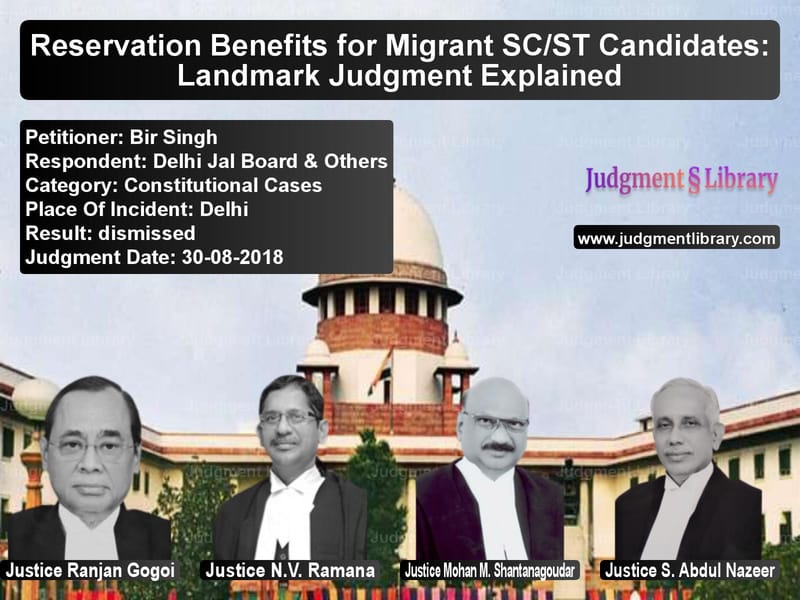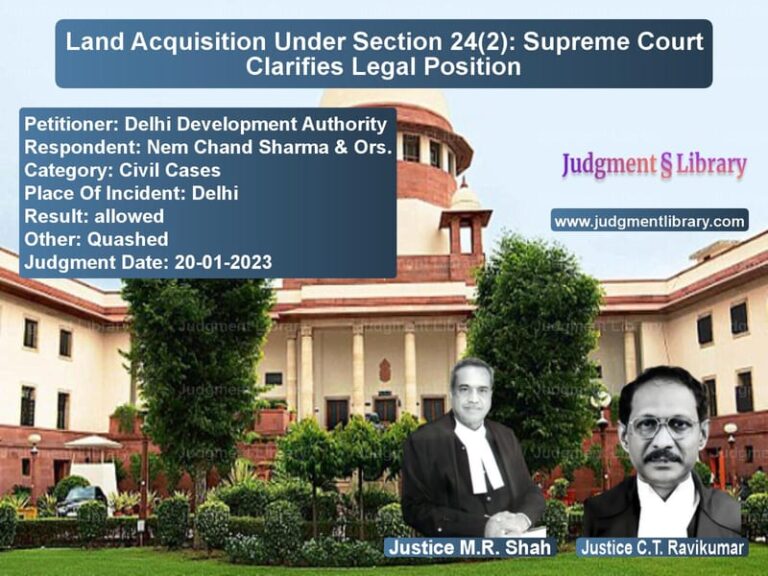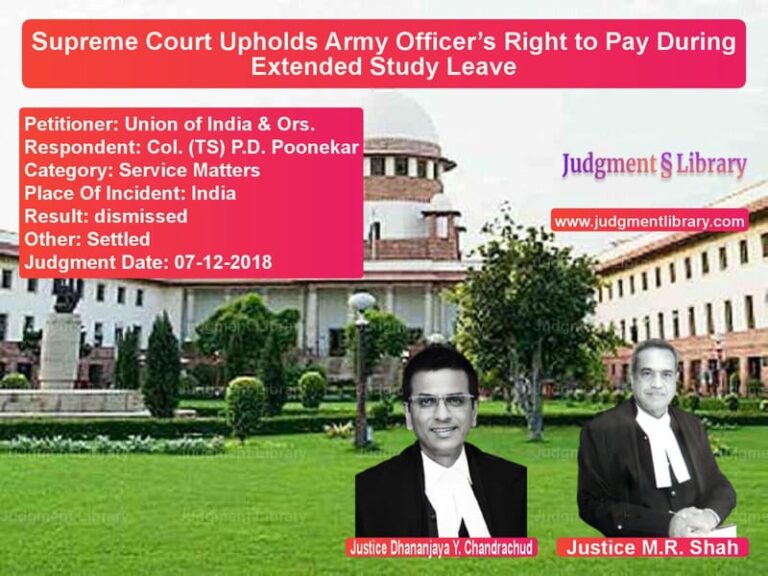Reservation Benefits for Migrant SC/ST Candidates: Landmark Judgment Explained
The case of Bir Singh vs. Delhi Jal Board & Others revolved around a significant constitutional question regarding the eligibility of Scheduled Caste (SC) candidates for reservation benefits in states where they migrate. The Supreme Court of India deliberated on whether a person recognized as SC in one state can claim the same benefits in another state or Union Territory.
Background of the Case
The petitioner, Bir Singh, had applied for a government job under the SC category in Delhi. However, his application was rejected on the grounds that his caste was recognized as SC in his home state but not in Delhi. Aggrieved by this decision, he approached the court seeking clarity on whether he should be entitled to reservation benefits irrespective of state boundaries.
At the heart of the case were Articles 16(4), 341(1), and 342(1) of the Indian Constitution, which govern the recognition of Scheduled Castes and Scheduled Tribes (SC/ST). The petitioner argued that SC status should be universally applicable across all states and Union Territories to ensure social and economic equality.
Petitioner’s Arguments
The petitioner made several key arguments, including:
- Article 16(4) of the Constitution empowers the state to make provisions for the reservation of SC/ST candidates in employment.
- State boundaries should not restrict SC individuals from availing benefits as their socio-economic disadvantages persist irrespective of migration.
- In centrally administered Union Territories like Delhi, reservation policies should be applicable to all SC candidates from any state.
- Excluding migrant SC individuals from reservation benefits violates the fundamental rights guaranteed under Articles 14, 15, and 16.
- He relied on the ruling in S. Pushpa & Ors. vs. Sivachanmugavelu & Ors., which had stated that Union Territories are under the control of the Central Government, and therefore SC reservation policies should apply uniformly across them.
Respondents’ Arguments
The Delhi Jal Board, representing the state authorities, opposed the petition and presented the following arguments:
- As per Articles 341 and 342, SC/ST recognition is state-specific and cannot be extended across state borders.
- The Presidential Order issued under these constitutional provisions determines which castes qualify as SC/ST in each state or Union Territory.
- If inter-state SC migration were allowed for reservations, it would disrupt the balance of employment opportunities for SC communities native to specific states.
- Union Territories, though administered by the Centre, do not have a uniform SC reservation policy. Each UT follows its own Presidential Order regarding SC status.
Key Observations by the Supreme Court
The case was heard by a bench comprising Ranjan Gogoi, N.V. Ramana, Mohan M. Shantanagoudar, and S. Abdul Nazeer. After careful deliberation, the Supreme Court ruled against the petitioner and made the following key observations:
- “A person notified as a Scheduled Caste in State ‘A’ cannot claim the same status in another State on the basis that he is declared as a Scheduled Caste in State ‘A’.”
- The Constitution does not provide for the automatic transfer of SC/ST status between states or UTs.
- The socio-economic conditions that warranted SC/ST classification vary from state to state, and therefore, reservation benefits should remain confined to the state where the community is officially recognized.
- Union Territories do not have a uniform reservation framework. Each UT follows its respective Presidential Order in determining which communities qualify as SC.
Precedents Considered
The Court relied on several previous rulings to reinforce its decision:
- M.C.D. v. Veena – Confirmed that SC benefits are limited to the state of domicile.
- State of Maharashtra v. Milind – Held that inter-state recognition of SC status is unconstitutional.
- Action Committee v. Union of India – Stated that state governments have full authority to regulate SC reservation policies within their jurisdiction.
Supreme Court’s Final Ruling
The Supreme Court ruled that reservation benefits cannot be extended to SC individuals who migrate to other states unless the Presidential Order for that particular state or Union Territory includes their caste. The judgment emphasized:
- “The Presidential Orders issued under Article 341 regarding Scheduled Castes and Article 342 regarding Scheduled Tribes cannot be varied or altered by any authority including the Court.”
- “It is the Parliament alone which has been vested with the power to do so, that too, by laws made.”
- The Court clarified that Union Territories do not automatically grant SC reservation benefits to migrants from other states.
Impact of the Judgment
This ruling has far-reaching implications for SC reservation policies in India:
- It prevents individuals from claiming SC benefits in states where they are not officially recognized.
- It upholds the autonomy of states in determining their own reservation frameworks.
- It clarifies legal ambiguities regarding inter-state SC benefits.
- It reinforces the principle that SC status is conferred only through official Presidential notifications.
Conclusion
The Supreme Court’s ruling in Bir Singh v. Delhi Jal Board & Ors. reaffirms that reservation benefits for SC individuals remain within the jurisdiction of the state where they are originally recognized. This decision ensures that state autonomy is preserved while maintaining constitutional clarity on SC status.
By dismissing the petition, the Court upheld the state’s decision to restrict reservation benefits to only those SCs who are explicitly recognized in the Presidential Order for that particular state or UT.
Petitioner Name: Bir Singh.Respondent Name: Delhi Jal Board & Others.Judgment By: Justice Ranjan Gogoi, Justice N.V. Ramana, Justice Mohan M. Shantanagoudar, Justice S. Abdul Nazeer.Place Of Incident: Delhi.Judgment Date: 30-08-2018.
Don’t miss out on the full details! Download the complete judgment in PDF format below and gain valuable insights instantly!
Download Judgment: Bir Singh vs Delhi Jal Board & Ot Supreme Court of India Judgment Dated 30-08-2018.pdf
Direct Downlaod Judgment: Direct downlaod this Judgment
See all petitions in Fundamental Rights
See all petitions in Constitution Interpretation
See all petitions in Public Interest Litigation
See all petitions in Judgment by Ranjan Gogoi
See all petitions in Judgment by N.V. Ramana
See all petitions in Judgment by Mohan M. Shantanagoudar
See all petitions in Judgment by S. Abdul Nazeer
See all petitions in dismissed
See all petitions in supreme court of India judgments August 2018
See all petitions in 2018 judgments
See all posts in Constitutional Cases Category
See all allowed petitions in Constitutional Cases Category
See all Dismissed petitions in Constitutional Cases Category
See all partially allowed petitions in Constitutional Cases Category







